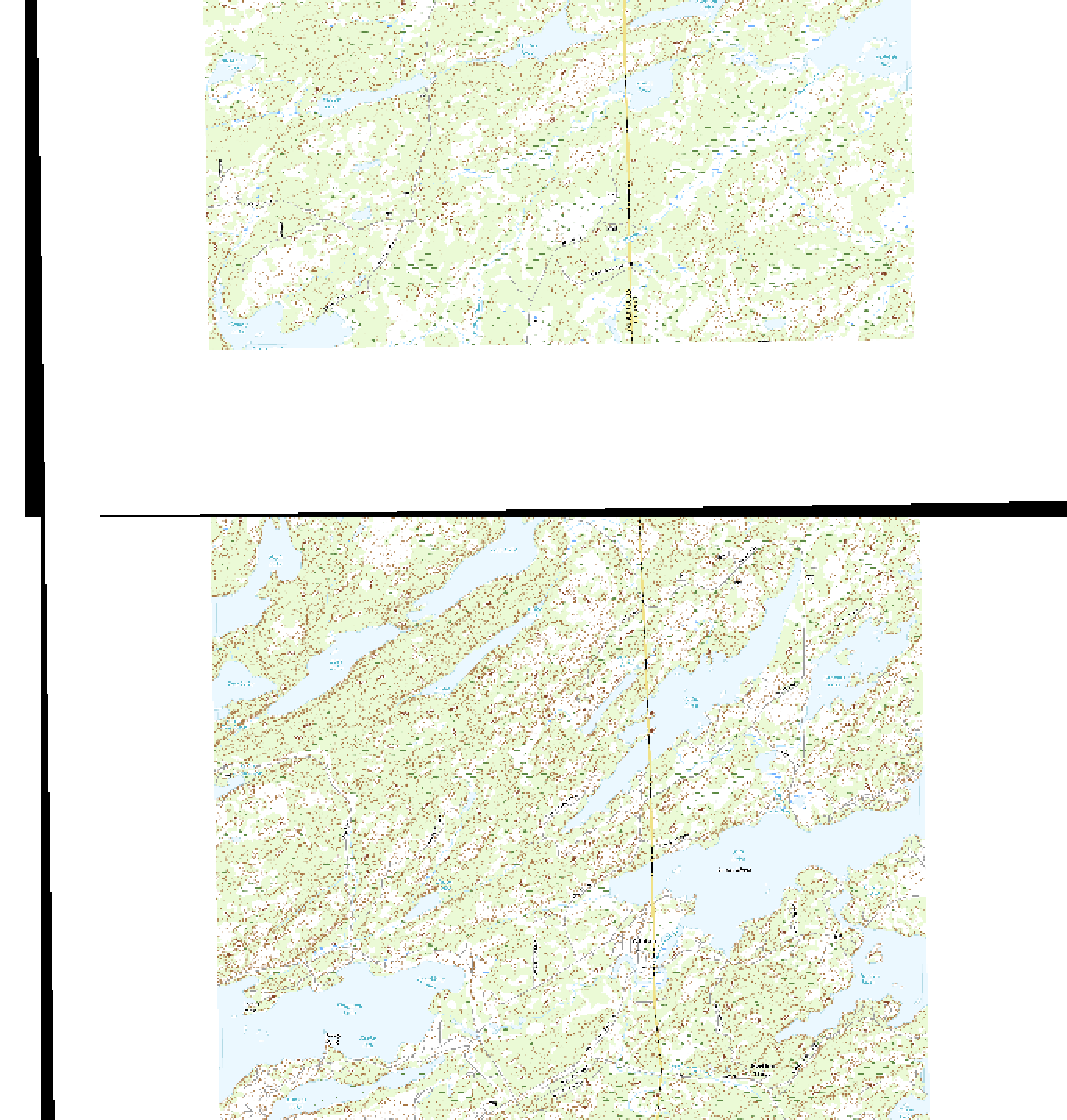ImI'm quite new to GIS (so please be patient with my incorrect terminology) but ImI'm teaching myself as much as I can in order to create my own map of the Boundary Waters Canoe Area in northern Minnesota. My My goal is to keep the resolution high enough to be able have it printed when ImI'm done on a 10' x 5' banner for a wall in my basement. IveI've been collecting all of the feature data I will need for the various layers IdI'd like to add, campsitescamp sites, trails, lake depth contours, historical forest fire data, ectetc.
ImI'm using QGIS on OSX, and have successfully created the map with all of the different layers, but the map services IveI've found do not have high enough resolution - I believe I will ultimately need ~300 DPI. So I turned to the UGSGUSGS topos to create my own basemapbase map.
For my base map, IveI've downloaded ~65 USGS 7.5 minute topo quads. IveI've successfully used GDAL and converted all of my GeoPDFs to GeoTiffsGeoTIFFs in order for me to be able to use them in QGIS, dropping all of the layers I do not want. Next, I need to tile them together, which seems like it should be easy..... but....
But now ImI'm stuck because of the collars, those dang collars!
IveI've been exploring 2two different paths.
Clipping / cropping / trimming the collars off of my tifsTIFFs. The only progress IveI've made here is using a 7.5 minute grid, creating a shape fileshapefile from each individual cell, then extracting each map file to the corresponding mask layer. Painful, and not perfect. I have small black spaces at each image intersection where the images overlap. This overlap issue leads to my second path:
Using the current tifTIFF files with overlap but somehow merging them but always honoring the image that is not blank
Things IveI've explored: -SAGA mosaic doesnt work as my tif files have multiple bands -I havent been able to figure out how to use nearblack, but at one point it seemed promising -gdal warp seems like it might be an option but I havent been able to figure it out.
- SAGA mosaic doesn't work as my TIFF files have multiple bands
- I haven't been able to figure out how to use nearblack, but at one point it seemed promising
- gdal warp seems like it might be an option but I haven't been able to figure it out.
ImI'm open to anything at this point, as ImI'm quite stuck.
In case it helps - here is gdalinfo for one of my images:
Files: O-MN_Lake_Agnes_20160511_TM_geo.tif.
Size is 6825, 8700 .
Coordinate System is:
PROJCS["NAD83 / UTM zone 15N",
GEOGCS["NAD83",
DATUM["North_American_Datum_1983",
SPHEROID["GRS 1980",6378137,298.257222101,
AUTHORITY["EPSG","7019"]],
TOWGS84[0,0,0,0,0,0,0],
AUTHORITY["EPSG","6269"]],
PRIMEM["Greenwich",0,
AUTHORITY["EPSG","8901"]],
UNIT["degree",0.0174532925199433,
AUTHORITY["EPSG","9122"]],
AUTHORITY["EPSG","4269"]],
PROJECTION["Transverse_Mercator"],
PARAMETER["latitude_of_origin",0],
PARAMETER["central_meridian",-93],
PARAMETER["scale_factor",0.9996],
PARAMETER["false_easting",500000],
PARAMETER["false_northing",0],
UNIT["metre",1,
AUTHORITY["EPSG","9001"]],
AXIS["Easting",EAST],
AXIS["Northing",NORTH],
AUTHORITY["EPSG","26915"]] .
GeoTransform = .
562647.9383617276, 2.031842193813695, 0.02475724967923335 .
5345953.334329214, 0.02475724967923335, -2.031842193813695 .
Metadata:
AREA_OR_POINT=Area .
AUTHOR=USGS National Geospatial Technical Operations Center .
CREATION_DATE=D:20160511071429Z .
CREATOR=ESRI ArcSOC 10.0.2.3200 .
KEYWORDS=Topographic, Transportation, Hydrography, Orthoimage, U.S. National Grid, imageryBaseMapsEarthCover, Imagery and Base Maps, Geographic Names Information System
NEATLINE=POLYGON ((574476.409995194 5330616.81030751,565063.890498903 5330502.12222002,564893.116537944 5344517.64268281,574305.636034233 5344632.3307703,574476.409995194 5330616.81030751)) .
SUBJECT=This image map depicts geographic features on the surface of the earth. It was created to provide a representation of accessible geospatial data which is readily available to enhance the capability of Federal, State, and local emergency responders for homeland security efforts. This image map is generated from selected National Map data holdings and other cartographic data.
TITLE=USGS 7.5-minute image map for Lake Agnes, Minnesota Image Structure Metadata:
INTERLEAVE=PIXEL .
Corner Coordinates:
Upper Left ( 562647.938, 5345953.334) ( 92d 9'21.06"W, 48d15'49.28"N)
Lower Left ( 562863.326, 5328276.307) ( 92d 9'20.03"W, 48d 6'16.73"N)
Upper Right ( 576515.261, 5346122.303) ( 91d58' 8.38"W, 48d15'49.27"N)
Lower Right ( 576730.649, 5328445.275) ( 91d58' 9.43"W, 48d 6'16.73"N)
Center ( 569689.294, 5337199.305) ( 92d 3'44.73"W, 48d11' 3.14"N)
Band 1 Block=6825x1 Type=Byte, ColorInterp=Red Band 2 Block=6825x1 Type=Byte, ColorInterp=Green Band 3 Block=6825x1 Type=Byte, ColorInterp=Blue
Files: O-MN_Lake_Agnes_20160511_TM_geo.tif.
Size is 6825, 8700 .
Coordinate System is:
PROJCS["NAD83 / UTM zone 15N",
GEOGCS["NAD83",
DATUM["North_American_Datum_1983",
SPHEROID["GRS 1980",6378137,298.257222101,
AUTHORITY["EPSG","7019"]],
TOWGS84[0,0,0,0,0,0,0],
AUTHORITY["EPSG","6269"]],
PRIMEM["Greenwich",0,
AUTHORITY["EPSG","8901"]],
UNIT["degree",0.0174532925199433,
AUTHORITY["EPSG","9122"]],
AUTHORITY["EPSG","4269"]],
PROJECTION["Transverse_Mercator"],
PARAMETER["latitude_of_origin",0],
PARAMETER["central_meridian",-93],
PARAMETER["scale_factor",0.9996],
PARAMETER["false_easting",500000],
PARAMETER["false_northing",0],
UNIT["metre",1,
AUTHORITY["EPSG","9001"]],
AXIS["Easting",EAST],
AXIS["Northing",NORTH],
AUTHORITY["EPSG","26915"]] .
GeoTransform = .
562647.9383617276, 2.031842193813695, 0.02475724967923335 .
5345953.334329214, 0.02475724967923335, -2.031842193813695 .
Metadata:
AREA_OR_POINT=Area .
AUTHOR=USGS National Geospatial Technical Operations Center .
CREATION_DATE=D:20160511071429Z .
CREATOR=ESRI ArcSOC 10.0.2.3200 .
KEYWORDS=Topographic, Transportation, Hydrography, Orthoimage, U.S. National Grid, imageryBaseMapsEarthCover, Imagery and Base Maps, Geographic Names Information System
NEATLINE=POLYGON ((574476.409995194 5330616.81030751,565063.890498903 5330502.12222002,564893.116537944 5344517.64268281,574305.636034233 5344632.3307703,574476.409995194 5330616.81030751)) .
SUBJECT=This image map depicts geographic features on the surface of the earth. It was created to provide a representation of accessible geospatial data which is readily available to enhance the capability of Federal, State, and local emergency responders for homeland security efforts. This image map is generated from selected National Map data holdings and other cartographic data.
TITLE=USGS 7.5-minute image map for Lake Agnes, Minnesota
Image Structure Metadata:
INTERLEAVE=PIXEL .
Corner Coordinates:
Upper Left ( 562647.938, 5345953.334) ( 92d 9'21.06"W, 48d15'49.28"N)
Lower Left ( 562863.326, 5328276.307) ( 92d 9'20.03"W, 48d 6'16.73"N)
Upper Right ( 576515.261, 5346122.303) ( 91d58' 8.38"W, 48d15'49.27"N)
Lower Right ( 576730.649, 5328445.275) ( 91d58' 9.43"W, 48d 6'16.73"N)
Center ( 569689.294, 5337199.305) ( 92d 3'44.73"W, 48d11' 3.14"N)
Band 1 Block=6825x1 Type=Byte, ColorInterp=Red
Band 2 Block=6825x1 Type=Byte, ColorInterp=Green
Band 3 Block=6825x1 Type=Byte, ColorInterp=Blue

